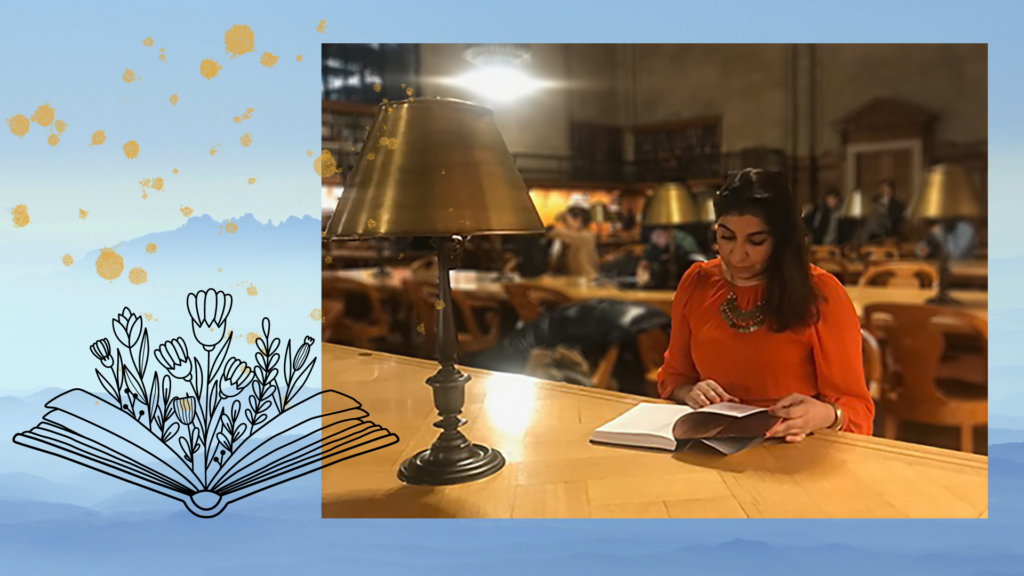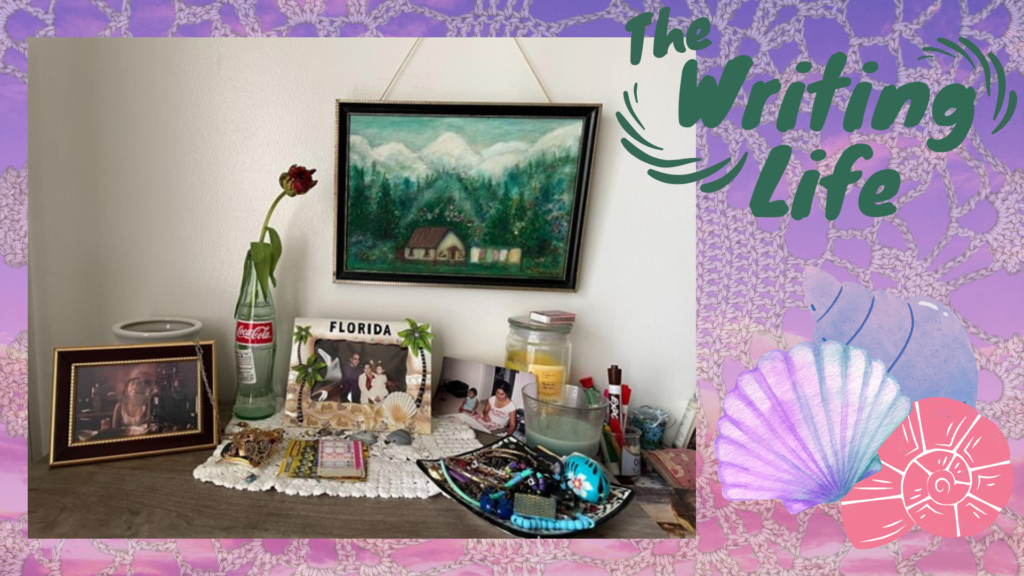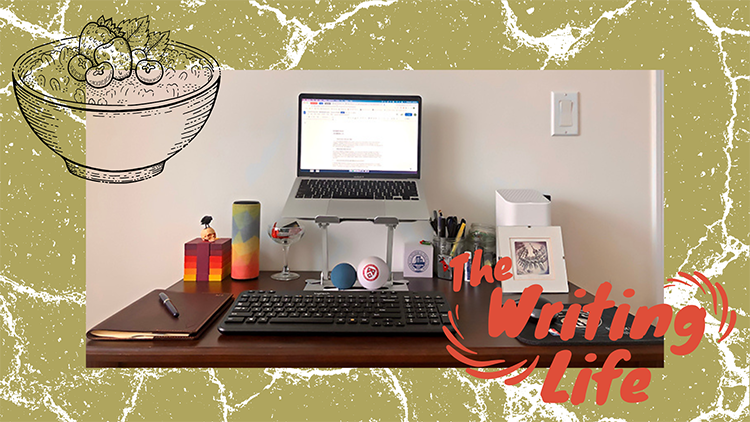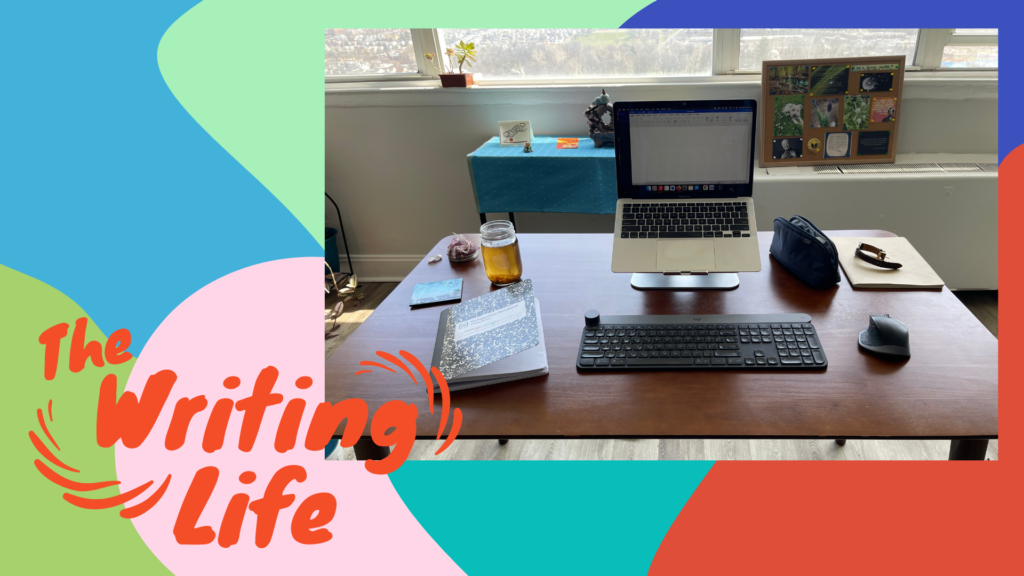Former Open City Fellow Syma Mohammed answers ten questions about her writing life

January 19, 2023
“Writing is easy,” Pulitzer Prize–winning sportswriter Red Smith once said. “All you do is sit down at a typewriter and open your veins, and bleed.” Putting pen to paper (or fingers to a keyboard) is never a simple task, even for seasoned writers. Even our Margins and Open City Fellows—and there’s quite a handful of them—can attest to that. Many of them, though, have gone on to write and report for mainstream publications and publish books. In this series, we reached out to our former fellows and asked them to give us a glimpse of their writing lives and to share some tips on how they navigate this creative process called writing.
Syma Mohammed is a 2018 Open City Fellow. She shone the spotlight on an iconic Brooklyn staple serving to bridge two cultures in “When Your Jewish Deli Is Run by Muslims.” After frequently visiting a Bangladeshi food cart vendor who has been away for almost forty years from his homeland, Syma asked in “Coming Home:” “Is ‘home’ still ‘home’, or is it a foreign country, a land full of strangers?” In “Love Bridges Religious Divides for Two Desi Dancers“, she explored how the dancing partnership between a Muslim and a Hindu blossomed into a Bollywood romance.
Here’s Syma.
—Noel Pangilinan
1. Coffee or tea? Why?
Can I say both? Tea roots me in both my ancestral and cultural heritage. I love chai with cinnamon, cardamon, and ginger, or a rose tea. I find the smell of both earthy spices and floral notes grounds me in my body. I also love the ritual of going to a coffee shop and gently inhaling and sipping a fragrant latte.
□ □ □ □ □
2. Any writer who influenced you growing up?
Antoine de Saint-Exupéry planted the deepest seeds with his book The Little Prince. Like other children, I consumed books by Enid Blyton, Roald Dahl, the Nancy Drew and Sweet Valley High series, as well as the classics. But Saint-Exupéry’s book, which on the surface is a children’s story, works at a much deeper level and feels nourishing. It grapples with themes such as friendship, love, loss, loneliness, innocence, capitalism, spirituality, and the heart. My favorite quote from it—one that continues to inspire me off the page—is: “Here is my secret. It’s quite simple: one sees clearly only with the heart. Anything essential is invisible to the eyes.”
I recently found out The Little Prince is actually a New Yorker. Saint-Exupéry started drafting Le Petit Prince in Manhattan, and finished writing and illustrating it in Northport, Long Island. There’s currently an exhibition running at the Morgan Library and Museum with pages of the original manuscript!
Overall, the writing that I find most satisfying tends to excavate feelings and emotions, has a spiritual aspect, and is written by someone who sees with the eye of the heart.
□ □ □ □ □
3. What book made you cry?
There are too many to mention since I have a sensitive heart! Any book that is well-written and has a sad narrative twist is guaranteed to make me shed tears. I last remember publicly crying while reading The Parted Earth by Anjali Enjeti. It centers on a blossoming relationship between two people across religious divides in the run-up to the irresponsible and catastrophic partition of India by the British, which led to the death and forced displacement of millions of people—including both sides of my family. The book was harrowing to read for lots of reasons, but underlying it is a message of hope about the redemptive power of love. While there are many different kinds of love featured in the book, it centers the power of romantic love to bridge differences that are politically used to divide and rule.
□ □ □ □ □
4. What time of day do you write best?
Ideally, I love writing in the quiet, velvety pre-dawn period or around the time the sun is coming up, just before the world is awake and people are emailing, messaging, or calling. But, as a night owl, I find most of my scribbling happens late at night before a deadline rather than when the birds are gently chirping!
□ □ □ □ □
5. How do you deal with writer’s block?
Walking and biking help me when I have trouble formulating a narrative thread. Being in motion somehow helps me to distill and crystallize ideas. With biking in particular, there’s something about being in physical flow that helps my mental flow. But I have also come to terms with the fact that I can’t force inspiration: I realize it comes from a source greater than myself. Everything has its time and place. All I can do is gently catch the droplets when they arrive.
□ □ □ □ □

6. What is your writing kryptonite?
Overthinking! When I am researching a piece, I tend to overread to get as much information as possible. I won’t start until I have read all I can. This can hold up my writing process. I wish I could allow myself the freedom of not trying to have all the data.
□ □ □ □ □
7. Did you ever consider writing under a pseudonym?
Yes. I once published an essay that garnered a lot of public interest—both positive and negative. Even my mum heard about it through a friend! I was invited to appear on radio to speak about it, and the piece was cited in other articles, books, and academic research. I wasn’t prepared for the response and found the whole experience overwhelming. I was invited to write some more articles but ended up not doing so because I wasn’t ready to step into the public spotlight. Since there are not many people with my name, and anonymity is therefore impossible, I have most definitely contemplated a pseudonym. For me, a pseudonym would allow me to highlight an issue without public visibility.
□ □ □ □ □
8. If you didn’t write, what would you do for work?
I would be a pilot. How can spending your time above the clouds gliding across oceans, deserts, and mountains not be the best thing ever?
□ □ □ □ □
9. What’s your favorite bookstore or library? Tell us why it’s your favorite.
The New York Public Library (NYPL) is my favorite library, particularly the Bryant Park location. I’ve always delighted in going to the Rose Room because it’s a beautiful, cozy space. I love the way light floods into the room through the huge windows, the way the table lamps emit a cozy yellow glow in the winter, the polished wooden tables, and the beautiful painted ceilings you can stare at when you have trouble putting a sentence together. Don’t all of us work better in beautiful spaces? I also love people-watching there.
I would love to give a shout-out to libraries in general—they were so pivotal in exposing me to a diverse range of writers growing up. I’m not sure I would have read as widely if it were not for my local library. The NYPL does an amazing job of making a variety of books available to New Yorkers from all walks of life for free. I hope people continue to fund libraries in the city, and across the country.
□ □ □ □ □
10. What’s the best or worst piece of writing advice you’ve received?
Writer and teacher Scott Korb, who was on my thesis defense committee, once gave me valuable feedback on my writing. He said that good nonfiction writing isn’t just painting the details of a person, scene, or event well, but it’s also the evocation of subtext; why the reader should care; the elephants in the room—the process whereby we bring reflection and wisdom to the piece.
It made me realize the older people become, the more wisdom and life experience shows up in their writing. I wish we celebrated wisdom in our culture just as much as we do youth.
□ □ □ □ □
Other stories in The Writing Life series:
“Inspiration is Everywhere” by Raad Rahman
“I Write Best While Having and After a Good Cry” by Nadia Misir
“Every Piece of Writing Should Express or Represent” by Mohamad Saleh
“When You’re Interviewing, You’re the One in Charge” by Eveline Chao
“Just Listen, Really Listen” by Roja Heydarpour
“No Other Way to Be a Writer Except to Be Alone in a Room” by Anelise Chen
That Which You Are Afraid to Write, Write It” by huiying b. chan
“Cut Down the Quotes . . . Include Only Gemlike Phrases” by E. Tammy Kim
“I Am Still Developing as a Writer” by Hannah Bae
“Write a Sentence—Any Sentence—No Matter How Bad It Is” by Astha Rajvanshi
“Intuition Is My Main Tool” by Chaya Babu
“Writer’s Block? What’s That?” by Humera Afridi



